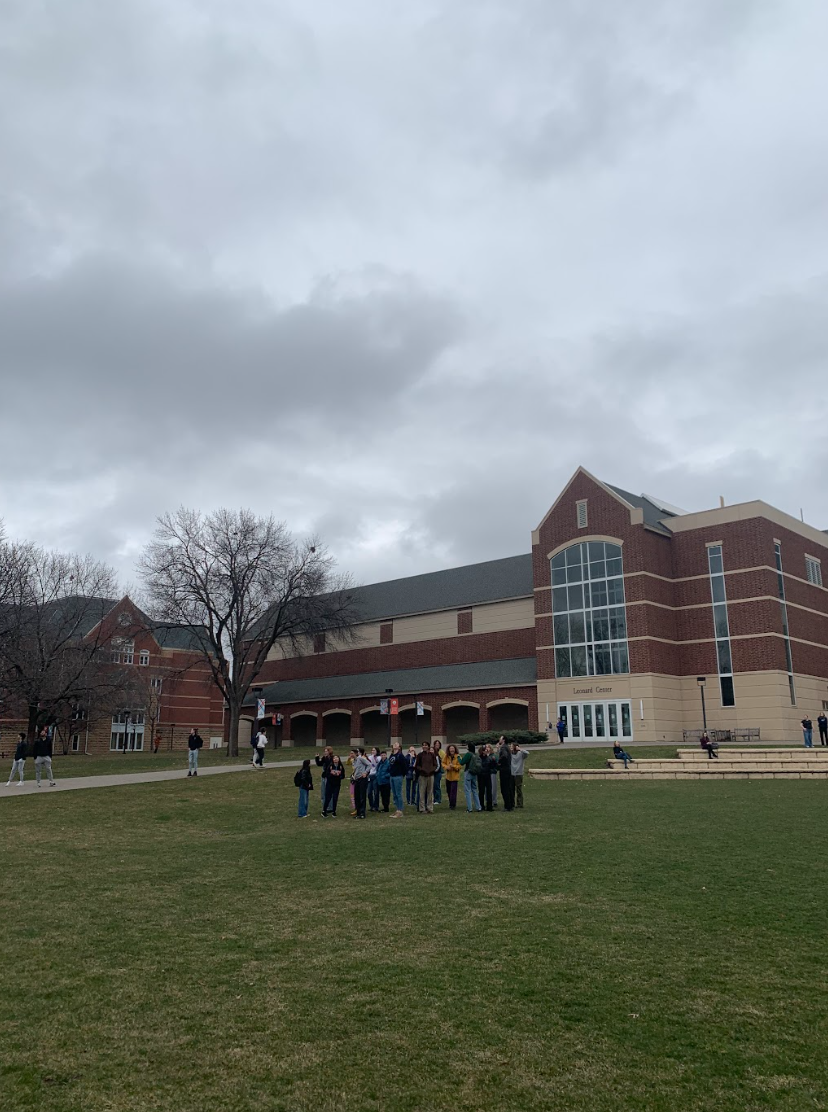At 12:53 a.m. last Thursday morning, Hunter Barrington ’20 posted in the Macalester Class of 2020 Facebook group. The post began, “I am a Trump voter.” Eight hours later, it had more than 40 comments.
Injected into the landscape of a deeply raw and emotional campus in the wake of Donald Trump’s election not 24 hours earlier, the post — which contained a link to an article from last November subtitled, “Why being a Republican doesn’t mean I’m inhuman” — set off a firestorm.
It also made Barrington the face of Trump support at Macalester. So why did he write the post? “I just got the sense that there was a lot of hate towards any Trump supporters after the election,” he said. “That those people were neglected, and their opinions were not considered.”
“Anything Trump on this campus was immediately shot down as being evil, hateful, racist. I went to one of these discussions that we had after the election, and they weren’t building any relations between both sides. All they did was talk about their support for the Hillary voters. They were so one-sided—there weren’t any diverse opinions. And I think that’s unfair.”
Barrington admitted that he didn’t personally face any abuse for his Trump support after Tuesday’s election—but there was, of course, no missing the grief and pain that enveloped the school on Wednesday.
“I didn’t get any direct hate, but I went to all three of my classes that day—and they all started with, ‘this is a terrible day, this is an awful day for America.’ It was obvious. The general voice on campus was, ‘this is the end of the world,’” Barrington said.
“I respect that opinion. All I want is to be able to talk about this.”
He also acknowledged that, “I am a white male. I’m probably more privileged than I sometimes realize.”
Barrington’s original post, and his replies to the number of comments that followed, were reserved and respectful. The message itself was much less about politics than it was a plea for open dialogue on campus.
The irony of that stance — a person who voted for Trump suddenly finding himself in a minority and asking for liberalism and tolerance — wasn’t lost on many.
Barrington, who plays fullback on the Men’s Soccer Team, hails from suburban Grand Rapids, Michigan. Trump won his home Kent County by 3.1 percent and crushed Clinton in the surrounding rural areas. Both of Barrington’s parents, along with his twin brother, voted for Trump.
Barrington’s two grandfathers both served in the military. One went on to become the Vice President of Steelcase, a Grand Rapids manufacturing company that produces, among other things, office furniture. All four of Barrington’s grandparents were born in the United States.
Barrington cast his vote for Trump in Minnesota, at the church here on campus. Secretary Clinton won Minnesota by 1.5 percent. She is currently trailing in Michigan, Barrington’s home state, by 0.3 percent.
When the results are finalized, this election will mark the first time that Michigan has voted for a Republican for president since supporting Ronald Reagan over Michael Dukakis in 1988.
Macalester, needless to say, has been a culture shock for Barrington. In the last week, he feels that it has let him down. “I came to Macalester for its devotion to multiculturalism. Its mission statement is to include all kinds of opinions, all kinds of backgrounds. To me, that includes political views.”
It’s a sentiment that struck some as breathtakingly shallow. One commenter, Alana Schreiber ’19, wrote, “I am sorry you felt uncomfortable today as a Trump voter. May I remind you that you likely only felt uncomfortable because of the immense fear felt by the majority of your classmates as a result of the election, a fear that you perpetuated.”
In an email to The Mac Weekly, Schreiber wrote that she felt compelled to speak out because, “I understood his want for acceptance, but it is not realistic… He cannot hurt people, directly or indirectly, and then expect them to want to accept and respect him.”
“I think that I should be able to discuss this with other people on campus. People see me, or other people who voted for Trump, and they immediately go to, ‘I’m hateful, I’m racist, or I don’t care about sexual assault victims or people of color,’” Barrington said.
“But I think if you had a chance to sit down and talk with me, and had an environment where opinions could be expressed freely, we could come to an understanding.”
Perhaps. Barrington’s support for Trump lies in what he calls “traditional Republican values.” He listed immigration, welfare, taxes and Obamacare as policy areas in which he agrees with the president-elect.
“I resonated with him on everything he had to say about putting America’s best interests first,” he said.
Obviously, nothing Trump did in the campaign cost him Barrington’s support. When asked what Trump could have done to lose his vote, Barrington was unable to come up with a clear answer.
In an interesting twist, the author of the article that Barrington linked in his message didn’t actually vote for Trump herself. In a statement obtained by Myles Ambrose ’17, Micaela Meadows wrote, “Like I said in the article, being a [R]epublican doesn’t mean I vote red automatically.”
“In the end, I can’t say that I filled in the bubble next to his [Trump’s] name; but I definitely didn’t fill in the one for Hillary either.”
As for the completely reasonable idea that a vote for Trump endorses, intentionally or not, racism, sexism, xenophobia, violence and oppression, Barrington simply doesn’t agree with the premise. “Trump never once came across to me as being racist,” he said.
It’s hard. These conversations are brutal. But if you really do believe in liberalism, and if you really do believe that we are stronger together, then casting out of our lives anyone who supported Donald Trump’s insidious bid for the White House is an admission of defeat.
That doesn’t mean normalizing Trump, or what he means for our country. It doesn’t mean passivity. But turning towards each other, certainly not in all cases, but wherever possible, is one of the great challenges that lie ahead—especially for those of us who can afford a measure of tolerance.
Barrington’s message — his request — can and rightly should be applied to any marginalized group. That first and foremost includes the millions of Americans who have been left shattered and stricken by this election.
“Before you go off and demonize Trump supporters, think twice about it,” Barrington said. “And if you really feel this way, let’s talk.”
Touché.


















Robert Gill • Sep 12, 2019 at 1:45 am
I do trust all the ideas you have offered for your post. They are very convincing and can certainly work. Still, the posts are too short for novices. May just you please extend them a bit from subsequent time? Thank you for the post.
Felicity Lawrence • Sep 6, 2019 at 11:04 am
This post is good and fruitful in favor of all new Personal home pages related web programmers; they must study it and do the practice.